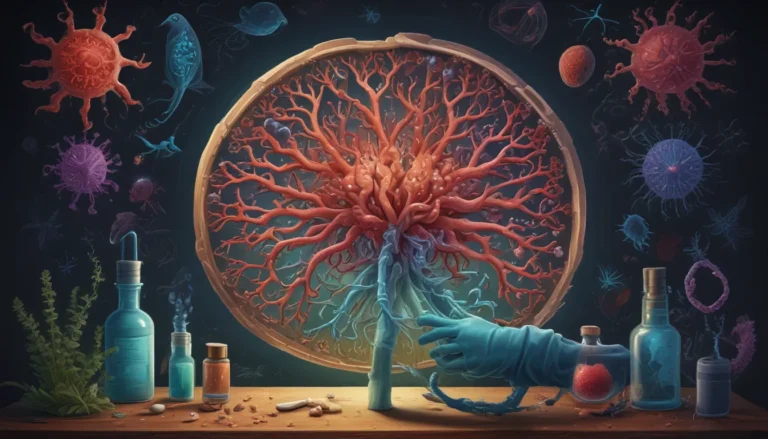A Note About Images: The images used in our articles are for illustration purposes only and may not exactly match the content. They are meant to engage readers, but the text should be relied upon for accurate information.
Immune tolerance is a fascinating aspect of our body’s defense system, playing a crucial role in maintaining our health and well-being. Understanding the complexities of immune tolerance can provide valuable insights into autoimmune diseases and potential therapeutic interventions. In this article, we will delve into the realm of immune tolerance and uncover 13 astonishing facts that showcase the intricate mechanisms and importance of this fundamental biological process.
The Astonishing World of Immune Tolerance
Our immune system is a formidable defense mechanism that keeps us safe from harmful invaders. However, it also needs to exhibit tolerance towards our own cells and tissues to avoid autoimmune diseases. Let’s explore some key takeaways:
- Our immune system distinguishes between friend and foe to prevent autoimmune diseases.
- Harnessing immune tolerance could revolutionize treatments for diseases and organ transplants.
Understanding the Foundations of Immune Tolerance
One of the most remarkable aspects of immune tolerance is its ability to distinguish between self and non-self entities. This discrimination is vital for maintaining normal bodily functions and preventing autoimmune diseases.
Immune tolerance is primarily established during early development, educating immune cells to recognize self-antigens and prevent immune responses against them. The body also employs peripheral tolerance mechanisms to maintain self-tolerance, including regulatory T cells and immune-suppressive cells.
Safeguarding Against Autoimmune Diseases
Immune tolerance plays a crucial role in preventing autoimmune diseases by ensuring that the immune system does not target self-antigens. However, when tolerance mechanisms fail, autoimmune disorders can arise, leading to chronic inflammation and tissue damage.
Oral tolerance, a unique form of immune tolerance, prevents excessive immune responses to harmless substances encountered through the oral route, such as food antigens. Additionally, maternal-fetal tolerance is essential for a successful pregnancy, as the maternal immune system adapts to tolerate the developing fetus.
Envisioning a Future With Immune Tolerance Therapies
With advancements in understanding immune tolerance, scientists have discovered ways to induce tolerance in laboratory settings. These innovations offer potential for improved treatments for autoimmune diseases and organ transplants by suppressing undesirable immune responses.
Organ transplantation often faces the challenge of immune rejection, but immune tolerance strategies can promote organ acceptance and enhance patient outcomes. Moreover, tolerance to allergens can be developed through immunotherapy, gradually building tolerance to reduce allergic reactions.
Embracing the Dynamic Nature of Immune Tolerance
Immune tolerance is not static and can be influenced by various factors, including environmental cues, infections, and genetic predispositions. Autoimmune diseases can exhibit periods of remission and flare-ups, influenced by the state of immune tolerance.
Research on immune tolerance is advancing therapeutic possibilities, paving the way for novel treatments for autoimmune diseases and related conditions. By modulating immune responses, researchers aim to restore balance and improve patient outcomes.
Unveiling the Mysteries of Immune Tolerance
Unraveling the complexities of immune tolerance unveils a world of possibilities for innovative therapies and interventions. The dynamic interplay between our immune system and its regulatory mechanisms offers promising avenues for enhancing health and well-being.
In conclusion, immune tolerance is a captivating area of study that holds immense promise for improving our understanding of autoimmune diseases and developing novel therapeutic approaches. By leveraging the remarkable properties of immune tolerance, researchers are poised to revolutionize the field of immunology and enhance the quality of life for individuals affected by immune-related disorders.
FAQs About Immune Tolerance
-
What is immune tolerance? Immune tolerance refers to the immune system’s ability to recognize and tolerate self-antigens while mounting appropriate responses to foreign antigens.
-
How is immune tolerance maintained? Immune tolerance is maintained through mechanisms such as clonal deletion, anergy, immune privilege, and regulatory T cells.
-
What are regulatory T cells? Regulatory T cells, or Tregs, play a vital role in maintaining immune tolerance by suppressing excessive immune responses and preventing autoimmune diseases.
-
Can immune tolerance be disrupted? Yes, disruptions in immune tolerance can lead to autoimmune diseases, where the immune system attacks the body’s tissues.
-
Are genetic factors involved in immune tolerance? Genetic factors can contribute to immune tolerance, potentially influencing the risk of autoimmune diseases.
-
Can immune tolerance be induced? Yes, immune tolerance can be induced through therapeutic approaches such as antigen-specific immunotherapy and regulatory T cell administration.
-
How does immune tolerance impact organ transplantation? Immune tolerance plays a critical role in minimizing organ rejection and improving transplant success.
-
Are there natural substances that enhance immune tolerance? Certain natural substances like curcumin and omega-3 fatty acids show promise in modulating immune responses.
-
Can immune tolerance be targeted for autoimmune disease treatment? Efforts are underway to develop therapies targeting immune tolerance pathways to treat autoimmune diseases.
-
Can stress affect immune tolerance? Chronic stress may impact immune function and potentially disrupt immune tolerance.
-
Is immune tolerance only relevant to humans? Immune tolerance is a fundamental aspect in various organisms, not limited to humans.
-
What are the future perspectives in immune tolerance research? The future holds promise for novel therapies, personalized medicine, and a deeper understanding of immune-related disorders.
As we navigate the intricate world of immune tolerance, we uncover the marvels of our immune system and the potential it holds for enhancing human health. Each revelation deepens our appreciation for the complexities of our bodies and fuels the quest for innovative solutions to immune-related challenges. Join us on this enlightening journey to explore the wonders of immune tolerance and its profound impact on our well-being.






